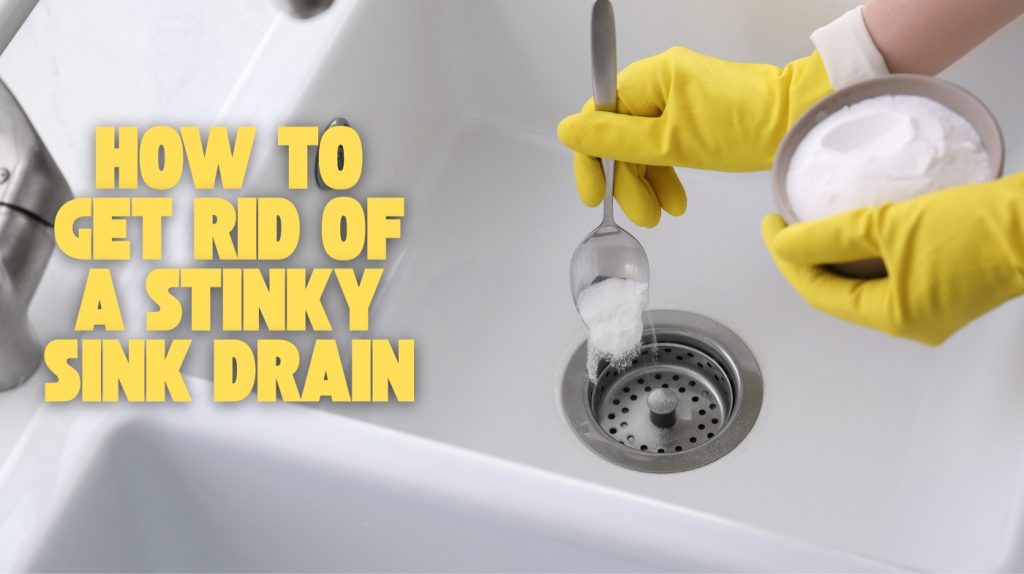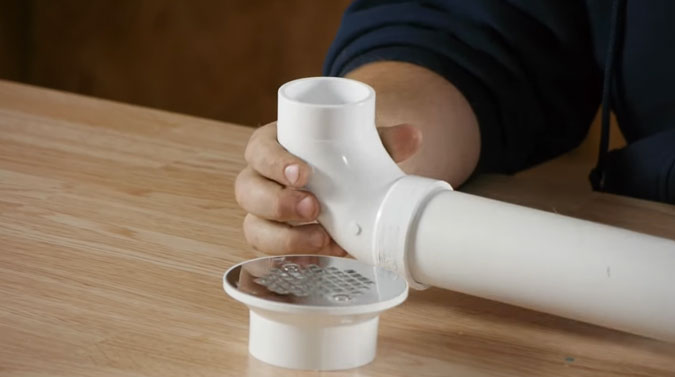Last Updated on August 18, 2025
To get rid of a stinky sink drain, start by flushing it with boiling water to dissolve grease and debris. Then, pour a mix of baking soda and vinegar down the drain to break down residue and neutralize odors.
Check and clean the P-trap and tailpiece for trapped food and mold. Avoid pouring fats or oils down the drain to prevent buildup. Keep your pipes sealed and well-maintained to block sewer gases.
You can explore more targeted cleaning and prevention methods ahead.
Key Takeaways
- Pour boiling water down the drain weekly to dissolve grease and prevent odor-causing buildup.
- Use a baking soda and vinegar mixture to foam, clean residues, and neutralize unpleasant smells.
- Regularly clean the P-trap and tailpiece to remove trapped food debris and prevent bacterial growth.
- Avoid pouring fats, oils, or grease down the drain and use sink strainers to catch food particles.
- Run water in unused sinks frequently to keep P-traps filled and block sewer gases from escaping.
Common Causes of Sink Drain Odors
When you notice a persistent foul smell coming from your sink drain, it usually stems from a few common causes related to buildup and plumbing issues. Food debris often gets trapped in pipes, especially if your garbage disposal doesn’t fully clear waste.
Decomposing food and congealed grease create blockages that promote bacterial growth and odors. Cooking oils solidify in pipes, trapping debris and fostering rancid smells. Excess grease can congeal on pipe sides and trap food debris, leading to rotting smells backing into your kitchen.
Trapped food debris and grease buildup in pipes foster bacterial growth and cause persistent foul odors. Mold and mildew thrive in damp, dark drain environments, producing musty odors that can mimic the smell of sewage.
Additionally, clogged plumbing vents can trap sewer gases, forcing odors back through your sink. Proper drainage and regular maintenance can help prevent accumulation in these areas and reduce odors.
Faulty plumbing, including leaks and improper pipe slopes, also encourages bacterial growth and allows sewer gases to escape indoors. Identifying these causes helps you target the source of sink drain odors effectively.
Understanding the importance of drain cleaning procedures can be key to maintaining a fresh-smelling sink.
Effective Household Remedies for Eliminating Drain Smells
Since drain smells often arise from grease buildup, food residue, and bacterial growth, you can tackle these issues effectively using simple household remedies.
Boiling water breaks down grease; baking soda and vinegar create a foaming action to remove residues; lemon juice adds antibacterial and deodorizing effects. Regular flushing and mindful drain use prevent odor recurrence.
Additionally, checking the P-trap ensures that sewer gases do not escape and cause persistent odors. If you notice persistent issues, consider inspecting for blockages or sediment buildup that can trap debris and cause smells.
| Remedy | Action | Benefit |
|---|---|---|
| Boiling Water | Dissolves grease & fats | Prevents buildup |
| Baking Soda & Vinegar | Foams to clear residues | Neutralizes odors |
| Lemon Juice & Baking Soda | Antibacterial & deodorizing | Fresh citrus scent |
| Regular Flushing | Maintains trap water seal | Blocks sewer gas escape |
How to Clean and Maintain Drain Components?
Eliminating drain odors starts with more than just surface cleaning; maintaining each component of your sink’s drainage system keeps it functioning properly and prevents recurring smells.
Regularly inspect the tailpiece for leaks, corrosion, or cracks, tightening slip-joint connections as needed. Inspect the tailpiece regularly for leaks or damage, and tighten slip-joint connections as needed.
Clean the P-trap by removing and clearing debris to prevent buildup that causes odors and slow drainage; check for damage and ensure slip nuts are secure. Using basic tools such as wrenches and gloves can make this task safer and more effective.
Incorporating energy-efficient practices can help reduce overall household maintenance costs. Don’t forget to clean the drain elbow, removing grease and debris, and inspect for leaks or cracks.
Replace any worn or damaged parts promptly, using PVC or stainless steel for durability. Check gaskets and washers periodically, replacing brittle or cracked seals and lubricating them lightly during installation.
Conduct monthly inspections and biannual deep cleanings to maintain ideal flow and prevent odors, ensuring your system operates reliably even during heavy rainfall.
Tips for Preventing Future Drain Odors
To prevent future drain odors, you need to adopt consistent habits that address the root causes of buildup and bacterial growth. Regularly flush your drains with hot or boiling water weekly to dissolve grease and food residues.
Use natural deodorizers like baking soda combined with vinegar or citrus peels to neutralize odors and break down minor buildup, but avoid overuse to protect older pipes. Cleaning faucet aerators periodically can also help eliminate buildup causing odors that contribute to unpleasant smells.
Prevent debris accumulation by using sink strainers and avoiding pouring fats, oils, or grease down the drain. Additionally, maintaining the proper water hardness level in your home water can reduce mineral deposits that contribute to odors.
Maintain water in P-traps by running water in infrequently used sinks to block sewer gases. Establish routine maintenance schedules incorporating these steps, and inspect for leaks or clogs regularly to ensure your drains remain odor-free and functional.
When to Call a Professional Plumber?
Regular maintenance can keep most sink drain odors at bay, but some problems demand professional attention. Call a plumber if your sink drains slowly despite clearing attempts, or if multiple drains show slow drainage, indicating possible main sewer clogs.
Water backing up or gurgling sounds suggest serious blockages or vent issues needing expert intervention. Persistent foul odors unresponsive to home remedies also require professional cleaning to address bacterial growth or mold safely.
Avoid DIY repairs when dealing with complex plumbing tasks like disassembling pipes, replacing shutoff valves, or sewer line issues; professionals have the right tools and diagnostic equipment.
Immediate plumber involvement is vital if you notice overflow, back-flow, or wastewater in sinks, as these pose health risks and potential property damage. Additionally, understanding the bidirectional design of certain valves can help plumbers efficiently manage flow control during repairs and maintenance.
Frequently Asked Questions
Can Certain Foods Cause More Drain Odors Than Others?
Yes, certain foods cause more drain odors than others because they decompose faster or produce stronger smells. Meat, seafood, dairy, and fatty foods release potent gases when breaking down. Starchy vegetable peels and egg residues also ferment, creating sour or sulfurous odors.
Fibrous scraps can trap buildup, worsening smells. You should avoid disposing of these foods frequently without proper cleaning to minimize odor development in your drains.
How Often Should I Clean My Garbage Disposal to Prevent Smells?
You should clean your garbage disposal at least once a month to prevent odors and maintain function. If you use it daily, weekly cleaning is better to stop gunk and clogs. Incorporate grinding citrus rinds weekly for freshening.
Always run cold water during and after use. Regular cleaning and maintenance reduce smells, prevent jams, and keep your disposal working efficiently. Adjust frequency based on usage intensity and household needs.
Are There Eco-Friendly Products Safe for Regular Drain Deodorizing?
Yes, you can use eco-friendly products safe for regular drain deodorizing. These contain natural, biodegradable ingredients and live bacteria or enzymes that neutralize odors without harsh chemicals. They prevent buildup by digesting fats and odors, are FDA-approved, and safe around pets and food areas.
While they work slower than chemical cleaners, regular use maintains freshness effectively and reduces environmental impact, making them suitable for routine maintenance.
Can Hard Water Contribute to Sink Drain Odors?
Yes, hard water can contribute to sink and drain odors. The minerals in hard water cause scale buildup that traps debris and organic matter, creating an environment for bacteria to thrive.
This bacterial growth produces foul smells like sulfur or rotten eggs. To reduce odors, you should regularly clean mineral deposits using vinegar and baking soda, and maintain proper water flow to prevent stagnant conditions where bacteria flourish.
Does Using a Drain Cover Help Reduce Bad Smells?
Yes, using a drain cover can help reduce bad smells by blocking debris and food particles from entering the drain, which prevents decomposition and odor buildup. It limits moisture and bacterial growth, and some covers create seals that stop sewer gases from escaping.
However, drain covers won’t fix odors from dried-out P-traps or plumbing issues. You’ll still need regular cleaning and proper plumbing maintenance to fully control drain smells.
Seal and Maintain Pipes to Keep Sewer Gases Out
Getting rid of a stinky sink drain is like clearing fog from a window; you restore clarity and freshness to your space. By tackling common causes, applying household remedies, and maintaining drain components regularly, you nip odors in the bud before they bloom.
Stay proactive with prevention tips, and don’t hesitate to call a professional plumber when problems persist. With these practical steps, you’ll keep your sink’s flow clean and odor-free, ensuring a fresher home environment.


